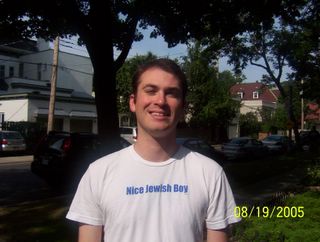The Arabs of Haifa
Are everywhere. It kind of caught me off guard. Haifa really is like no other city in Israel and exemplifies a degree of Arab-Jewish coexistence that probably has no occurred at any other time in history and certainly does not exist in the world anywhere else today. Let me explain.
Our residence, Abba Hushi, is right near an Arab neighbourhood, called Hadar, I believe. Arabic is the prominent language on the store signs. The area is a bit run down, but not a slum. Arabic is the language your hear most people speaking. Yet there are also Jews milling about. Turn the corner, and their will be a Hebrew establishment. This degree of mixing is fascinating. Also, it should be noted that of Haifa's 24,000, the majority (I've heard between 60 to 70%) are Christian, a big difference from the rest of Israel and especially the West Bank (I would say occupied territories, but I keep forgetting, we're out of Gaza). Indeed, you will see many male Arabs walking around with crosses around their necks. I've been asking myself this interesting sociological question: Are these believing Christians, or do they simply want to identify themselves as Christians, because Jews may have a more positive disposition to them rather than Muslims? I don't know the answer yet.
I do know that Arab neighbourhoods means non-kosher food, and stuff open on Shabbat. Of course, Haifa is so wonderfully secular that many Jewish establishments are open on Shabbos and also feature non-kosher food (see Dunk Pub). But still this is good. People say the area can be dangerous, but I never felt unsafe. It is certainly less dangerous than any innercity neighbourhood in the United States.
This is not to say that there is no segregation in Haifa. Up the hill, where the middle and upper middle class people live (including my host family) and where Haifa University and the Technion (Israel's MIT) are located, is an almost entirely Jewish area. The bottom of the hill is where the Arabs lived, but there are more than enough Jews, including recent immigrants, so that Arabs and Jews must live together, side by side.
Another interesting socio-economic reality is that the Jews that most Arabs in Haifa seem to encounter are not the wealthy Ashkenazi Sabras but the recent immigrants, Ethiopians, Russians and Mizrachi. I wonder if this is sort of like the way the Blacks and the Irish interacted in early 20th century Boston. Do the immigrants feel like the only people they can look down upon are the Arabs? Do they resent the fact that though their Jewishness grants them certain privileges, they are not as established as Arabs who have lived here for generations? Do the Arabs resent the privileges granted to these recent immigrants? Or do the two groups find an affinity in their situation towards the bottom of Israel's socio-economic ladder?
I also like the fact that I can speak Hebrew to Arabs rather than English. Here's an interesting little story: I went to get myself a haircut in the local square, which has stores that are, as I can tell, Jewish owned (including one kosher restaurant which are hard to come by here and many Russian establishments). The barber (or hairdresser?) was a Jewish Israeli, possibly homosexual (I really only like to get my hair cut by fat, bald, elderly, heterosexual, Italian or otherwise mediterannean men, or by younger homosexuals). He had lived in Toronto for 12 years and insisted in speaking to me in English. While waiting, I chatted with three cute girls sitting on the couch. We spoke in Hebrew, I asked them how old they were. They were 18, a bit young, but legal. "Oh, so you're going to the army next year?" I asked. "No," they replied. "We're Christian." I had been flirting with Arabs. There's nothing wrong with this, of course, and it just goes to show how similar the two populations are and how intermingled they are in Haifa.


0 Comments:
Post a Comment
<< Home